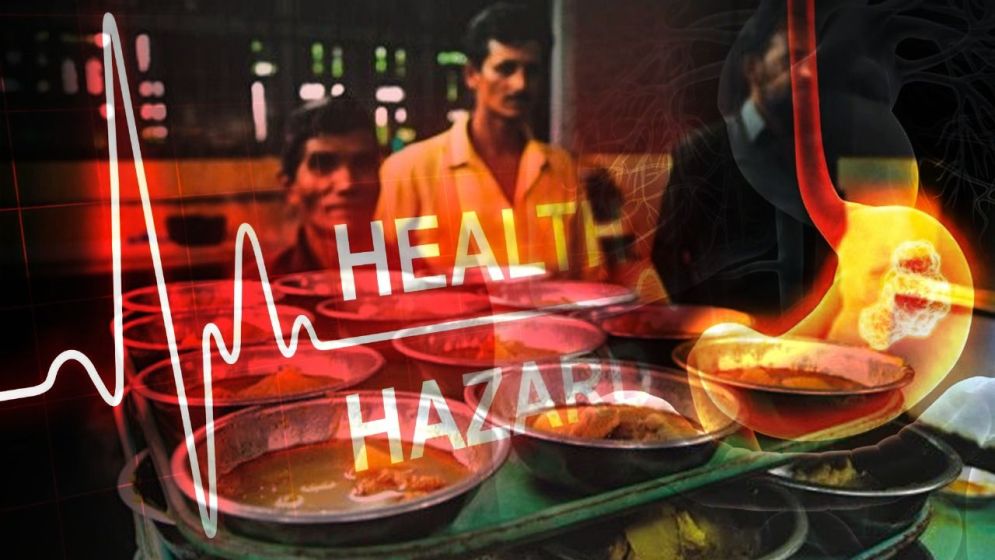Malnourished minds: The hidden crisis in Bangladesh’s university dining halls

Years ago, an older student from Dhaka University shared something with me that seemed odd at the time: a startling number of students, he said, suffered from stomach ulcers.
I was skeptical. He urged me to stop skipping meals. “Eat on time,” he said. “This is how it starts.”
It’s only now–after years of navigating Bangladesh’s higher education system–that I realize how right he was. What seemed like a trivial comment now strikes at the heart of a deeper, institutional problem: our universities are quietly breeding grounds for illness.
This is not hyperbole. Ulcers, malnutrition, and depression are endemic across our campuses. While universities in other countries might impart knowledge, discipline, and resilience, ours often seem to leave students with something else entirely: chronic health conditions.
Why bring this up now? Because it’s time we consider a disturbing hypothesis–one that links higher education in Bangladesh directly with disease.
It begins the moment a student steps into the system. The first battles are for food and housing. These are the most basic requirements for any human being, yet in our institutions, they are unreliable luxuries.
I studied at a government medical college, which, on the surface, should fare better.
Medical students tend to have more financial resources, thanks to family support and stipends. But even here, the situation was bleak. The hospital area lacked even two reliable restaurants.
Students were forced to fend for themselves or eat in unhygienic, damp, makeshift diners–places that would never pass a basic food safety inspection.
When I was admitted to Shaheed Suhrawardy Medical College, I had the chance to transfer to Salimullah. I didn’t. But every time I visited Old Dhaka and saw the bustling eateries, I felt pangs of regret.
I imagined my peers gorging on biryani three times a day, living the culinary dream of every exhausted med student.
Of course, that dream came at a cost. A friend from Dhaka Dental College, who did exactly that–ate biryani from a nearby hotel for a full year–ended up with acute pancreatitis and non-alcoholic fatty liver disease.
At Suhrawardy, our dining hall food was so bad that a recent informal survey I conducted found that nearly all upper-year students had stopped eating there.
Most of my friends either cooked their own meals–an exhausting task on top of their studies–or settled for greasy plates at dingy hotels like Ananya or Sadia. These were not places you’d expect to find the country’s future doctors eating every day.
And when they graduate, they’ll be doctors who learned about public health while living in environments that violated its most basic principles.
Perhaps that’s the cruelest irony of all.

Severe health hazards
You cannot imagine the pain of acute pancreatitis unless you’ve seen it–or felt it.
It is immobilizing, cruel. When the flare hits, you lie face down, helpless, praying for the pain to recede. That’s what happened to a friend of mine, a medical student who, for a year, lived on biryani from a cheap hotel near campus.
And yet, his story isn’t an exception. It’s a symptom.
Not long ago, a research abstract in the daily paper caught my eye: a growing number of people in Bangladesh now eat only two meals a day, skipping breakfast altogether due to rising food prices.
It made me wonder: what if we ran this survey on university students alone? The numbers would be staggering.
In my circle, I’d estimate at least half of the students skip breakfast regularly. Many have lunch so late it practically becomes their first meal of the day.
The consequences are immediate and insidious: disrupted sleep cycles, disordered digestion, and in the long term, corrosive damage to the stomach lining from unbuffered hydrochloric acid. It's not an inconvenience–it's a precursor to chronic disease.
We are slowly producing a generation prone to gastric ulcers, a condition with known links to stomach cancer. But this isn’t just about digestive health. Poor nutrition in youth shapes long-term outcomes.
Life expectancy, cognitive function, immunity–all are being quietly but profoundly affected. We won’t see the full impact for decades, but when this generation ages, we will be forced to reckon with a grim question: Did our universities make them sick?
The answer is yes–physically and mentally.
Mental health, like physical health, starts with food and sleep. And both are consistently undermined in our universities. A young person who doesn’t eat regularly, who sleeps poorly, isn’t “resilient” or “forged in hardship.”
He’s being hollowed out. The romanticism of struggle is a lie we’ve told ourselves too long. Malnutrition doesn’t create strength; it creates stunted bodies, fogged minds, and emotional fatigue.
We’ve seen this before. Generations of Bengalis, deprived of protein, became physically smaller over time. If today’s young people continue to eat the way our institutions are forcing them to–scarce meat, no breakfast, inconsistent nutrition–we may see not only stunted bodies, but stunted minds.
If current trends hold, a disproportionate number of this country's educated youth will face gastric and colorectal cancers before they’re even old.

Foods and politics
And what are they eating now? In many halls, there’s no meat–at all. Or if there is, it’s so poor in quality it borders on inedible.
Students in their most formative years are living on oily lentils, soggy rice, and protein so scarce it’s functionally absent.
Our medicine professor once told us that abroad, a "poached egg" can mean three or four eggs at once, cooked gently, eaten with care. Here, the thought of eating four eggs together feels like an extravagance.
Most students have never done it. They can’t afford it–or more accurately, the system is designed so they never could.
This starvation has consequences. It shows up not just in blood reports, but in behavior–in the culture of our institutions. It shapes how students think, relate, lead, and fight. It casts a long shadow on student politics, activism, and the broader social environment of campus life.
Starved bodies produce short tempers, low energy, and a sense of powerlessness that festers.
Walk around any campus in Bangladesh long enough, and you’ll see the pattern. The quiet, undernourished student–your familiar, skinny friend–starts drifting toward campus politics.
At first, it seems harmless. He attends a meeting, carries a banner, shows up for roll calls. But behind the performance is a hunger more basic than ideology: he’s in it for the food.
It begins with free meals–fish curry on Fridays, maybe a plate of biryani on Victory Day. But it rarely stops there. Once this basic need is fulfilled, other comforts follow: a better dorm room, protection, status. Slowly, almost imperceptibly, the line between necessity and opportunism blurs.
And eventually, survival mutates into ambition.
This is how hunger builds monsters–not overnight, but meal by meal.
We often talk about campus politics in terms of power, ideology, or corruption. But have we considered that some of the worst instincts on our campuses might be fueled, quite literally, by an empty stomach?
There’s something deeply troubling about the idea that young people–bright, ambitious, idealistic–are selling their time, dignity, and values for a few servings of meat.
Yet that’s the unspoken transaction happening on university campuses across the country. And we continue to ignore it, as if it's inevitable.
It isn’t.

Foods for thoughts
If you want to reduce toxic politics on campuses, start with the dining halls.
Solve the food crisis, and you might just reduce the number of opportunists-in-the-making. It sounds simplistic, even naive–but think about it: a university should nurture thinkers, not teach young people to hustle for a free lunch.
In fact, the students who live at home tend to have better mental health. Why? Because they eat and sleep at regular hours–if not by choice, then at least out of routine.
Regular meals and sleep, modest as they sound, offer powerful protection against depression and anxiety.
Of course, there are exceptions. One tragic case involved a BUET student who lived at home but had such a disordered sleep cycle that he routinely woke up at sunset. But exceptions don’t disprove the rule–they only underscore how fragile student wellness is when basic rhythms of life are broken.
Most of the depressed young men I know eat tasteless, inconsistent meals and stay up all night.
They aren't just tired–they’re nutritionally and emotionally depleted. And here’s a surprising but consistent observation: the problem is less common among female students.
Why? Because many of them cook for themselves. They go to bed earlier. They wake up earlier. The difference is not just gendered–it’s behavioral.
The ability to cook may seem like a trivial domestic skill, but it translates into stability, discipline, and better mental health. The women who cook and manage their routines outperform the men who don’t.
So here’s a modest proposal for national progress: teach young men how to cook. Not just for independence, but for their mental health and academic success.
And from the institutional side, invest in food–real, hygienic, flavorful food. Not sludge in a steel plate. Not watery lentils passed off as dinner. Real food, in sufficient quantity, available on every campus.
This may sound like a cry in the wilderness, but I’ll say it anyway: every higher education institution in Bangladesh must provide safe, affordable, and dignified food.
Because if we don’t, our universities will soon top a very different kind of global ranking: leading the world in the production of ulcers, cancer, and depression.
—
Shajid Bin Azad is a writer

